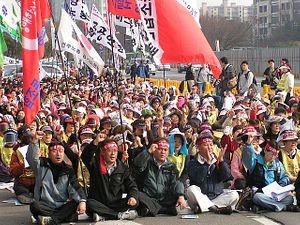South Korean corporate culture is well known for its challenges: It is extremely competitive, hierarchical, and exhausting. However, an increasingly common characteristic of corporate work is the “temporary contract worker” (bijeonggyujik). Temporary work, rather than full-time employment, has become increasingly common since labor market deregulation in the late 1990s, following the Asian Financial Crisis (1997-1998). It has, as of late, become an increasingly central political subject, thanks, at least in some part, to dramatic protests about the precariousness of temporary contract work in South Korea.
Under current law, temporary contracts can be employed for a maximum of two years. This setup creates great uncertainty for many workers who are often employed on temporary contract work. A current hit TV series airing on South Korea’s tvN, Misaeng, or “An Incomplete Life,” depicts everyday life for white-collar employees in a trading company. One of the characters, Jang Geu-rae, is a temporary worker. The precariousness and uncertainty of his position – he holds the seemingly futile hope of eventually being hired as a full-time worker – resonates with many South Koreans in similar positions. If the show’s smashing success is any indication of its reflection of truth, then “An Incomplete Life” has hit the nail on the head: The show’s popularity has soared.
The government, in a bid to address the social and economic strains of temporary contract work, has announced a labor market reform plan that would, in its opinion, improve the conditions of temporary workers. The proposed plan will, according to Yonhap, “allow irregular and subcontract workers aged 35 or older to work for up to four years at the same workplace as part of efforts to improve their working conditions and dismantle discrimination against them.”
Interestingly, the plan is dubbed the “Jang Geu-rae Protection law” (Janggeurae bangibeob). A JTBC “Fact Check” segment problematizes the notion that the proposed plan would actually help non-full time workers. According to JTBC’s report, the plan’s largest advocate, the Ministry of Labor, is pushing the plan under the assumption that if workers stay with a company for four years then their chances of being hired as a full-time workers increase significantly, because letting them go at that point wouldn’t be a cost effective move. In addition to any severance pay, the new plan would require firms to pay an additional allowance after the worker completes a temporary contract. However, according to JTBC’s appraisal, this arrangement does not decrease the total cost of not hiring temporary workers on as full-time employees.
The plan follows an announcement from the Ministry of Finance that further structural adjustments be made to the labor market to add more flexibility. Efforts to strike a balance between labor market flexibility and social security are likely to define business-government and business-social relations in the near future.

































